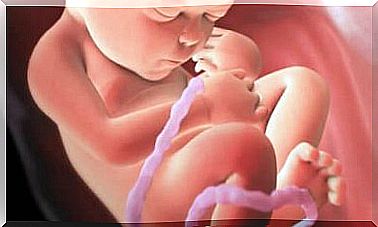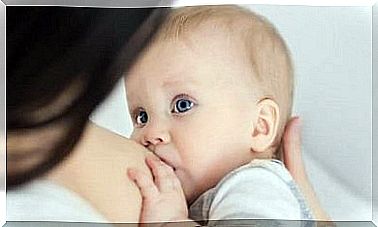Digestive Diseases In Babies

Digestive diseases can be very unpleasant for your baby, but with the right treatment, they can be alleviated. We will show some simple tips to avoid them.
Digestive disorders occur more often in babies than we might think. In fact, statistics show that about 50% of babies suffer from mild digestive disorders in their first months of life.
This is due to immaturity in their digestive systems. Although these problems can often be overcome with dietary changes, it is important to identify them, to prevent impact on the child’s development.
Digestive diseases in infants
There are various digestive diseases that babies like and in general they are quite unpleasant for them.
Although these disorders have the power to generate great concern in parents, we must remember that they are actually quite common. With the right treatment, their discomfort can be alleviated.
Here are some of the disorders that a baby can suffer from:
Colic
Colic or abdominal pain is the mildest disorder that a newborn can get, especially when feeding from bottle. This pain can cause loud screams that often decrease in intensity after expelling gases.
To relieve colic, you can perform massage on their stomach, from top to bottom. You can also perform massage clockwise.
Diarrhea
Breastfeeding can cause your baby’s stools to have a special color and consistency. They will be thin, granular and golden yellow in color.
If you feed your baby’s artificial formulas, their stools will be inconsistent and light colored. In any case, you should consult your pediatrician if you experience diarrhea.
Babies are at high risk of suffering from dehydration. Diarrhea in infants usually has an infectious origin.

Reflux
Regurgitation usually occurs after feeding. It happens when the baby expels their food after getting too much. This can only be avoided by carefully looking to find out when the baby is full.
This prevents them from eating more than they need. Regurgitation is not always abundant and they usually occur immediately after feeding the baby. They can be triggered by the slightest movements and they are caused by immaturity in the baby’s digestive tract.
Constipation
Incorporating solid foods into the baby’s diet or a change from breast milk to formula can cause digestive disorders such as constipation. When this happens, it is best to consult with your pediatrician. The most effective treatment is simply to change the baby’s diet.
Hiccup
This can be quite persistent and lasting, but it should be the least of our worries as it does not harm the baby. It occurs unusually for no apparent reason and later disappears spontaneously. In fact, babies may even suffer from hiccups inside the womb.
What causes gas
Gas can be an indication that the baby’s digestive system is developing problems. Some babies cannot digest lactose or breast milk substitutes completely because they do not have the enzymes to break down the component.
Although this problem usually resolves spontaneously as the child develops, it is important to inform your pediatrician to find solutions.
How do you help your baby?
- Lay the baby upright when it is feeding time.
- Make your baby burp a little, by giving him light pats on the back.
- You can try applying a gentle massage on their abdomen to relieve pain.
- Try feeding them small amounts.
- Soothe baby when they cry to prevent them from swallowing air.

What are the symptoms of digestive problems?
The fastest way to detect digestive problems in your child is by analyzing their attitude every day. For example, if they feel uncomfortable, sad, or upset after eating, it is most likely because they feel bad.
You may notice that they contract and extend their legs toward their abdomen to try to relieve the pain or discomfort. Another suggestion that the baby suffers from digestive problems is when they cry uncontrollably.
These digestive diseases, which we mentioned above, are quite unpleasant for your baby and can cause concern among parents. But they are completely normal in the first months.
If you have any questions or concerns, it is best to consult with your pediatrician.









